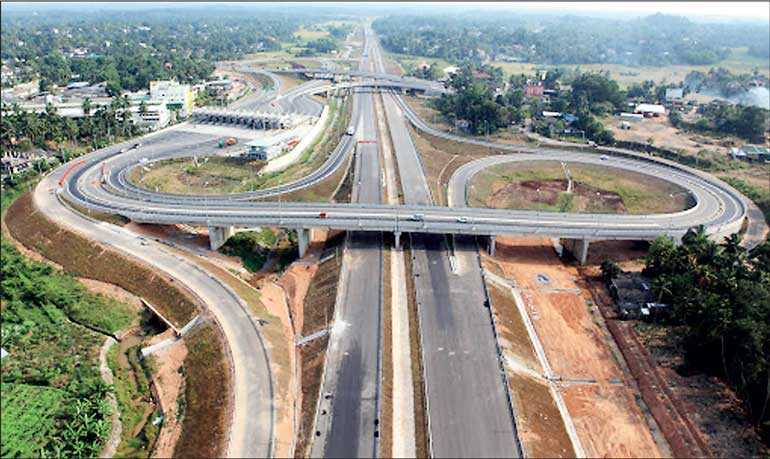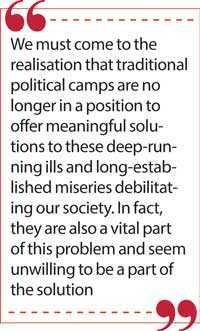Saturday Feb 07, 2026
Saturday Feb 07, 2026
Wednesday, 28 April 2021 00:00 - - {{hitsCtrl.values.hits}}

When it comes to a development project of any magnitude, our politicians begin the process with the question, ‘What’s in it for me?’ Even when such projects do not yield any tangible financial or materialistic benefits to themselves, they seek to utilise the outcomes of these initiatives to enhance their electoral prospects
 Sri Lanka is rapidly sinking into a socio-economic chasm for a multitude of reasons; the economy is on the verge of bankruptcy and society is engulfed in power-hungry, self-seeking politics that has divided Sri Lankans sharply and decisively.
Sri Lanka is rapidly sinking into a socio-economic chasm for a multitude of reasons; the economy is on the verge of bankruptcy and society is engulfed in power-hungry, self-seeking politics that has divided Sri Lankans sharply and decisively.
We must come to the realisation that traditional political camps are no longer in a position to offer meaningful solutions to these deep-running ills and long-established miseries debilitating our society. In fact, they are also a vital part of this problem and seem unwilling to be a part of the solution.
It is pointless to debate whether this crisis originated in 1931, 1948 or 1977 as the collapse is rapidly reaching the point of no return. Intense debates on who is responsible for this systemic failure does not give us any insight into how the present situation can be overcome in order to usher in a stable future for Sri Lanka.
Nevertheless, it is critical to understand why every government that came into power since 1948 failed to deliver desired results contributing to the current situation Sri Lanka finds itself in. Was it because of partisan political interests or was it because of their insatiable and incurable greed for power?
The common understanding is that the insatiable greed for power on the part of politicians and the corruption associated with it are the root cause of Sri Lanka’s current plight. This is, in my view, an incomplete conclusion.
Politicians in Sri Lanka have a skewed sense of identity that makes them corrupt to the core in most instances. Their sense of identity often revolves around themselves, their families and friends or cronies. These extremely narrow boundaries of individualism propel them into corruption and abuse of power mainly to serve the interests of themselves, their families and friends.
Take, for instance, any mega or minor scale development project in Sri Lanka. Our politicians often approach such projects looking for avenues to fatten their own purses and fatten the purses of their families and friends in one way or another as well. They do not know any better, as their warped sense of identity and individualism does not allow them to see anything beyond these limited boundaries.
Even the current debate on the controversial Port City Bill is mostly centred around the fears that the project might be used for money laundering and to cater to the needs of a handful of unscrupulous “investors” in the long run, without serving the needs of the people.
Almost all major controversies in the recent past — be it the Treasury bond scam or the alleged sugar tax fraud — stem from the need to satisfy the greed of political cronies who are closely interlinked with those who wield political authority. 
When it comes to a development project of any magnitude, our politicians begin the process with the question, ‘What’s in it for me?’ Even when such projects do not yield any tangible financial or materialistic benefits to themselves, they seek to utilise the outcomes of these initiatives to enhance their electoral prospects. Almost every development project in Sri Lanka, therefore, is tainted with personal interests causing irreparable damage to society.
Our task at this point is to foster a political culture in which this skewed sense of individualism and its narrow boundaries are challenged.
A good leader should have an inclusive identity that enables him to see every man’s problem as his own problem and every person’s well-being as his own well-being. The leader’s idea of identity and individuality should transcend ethnic, racial, religious boundaries and all forms of personal affiliations.
Such leaders, for instance, embark on social development projects without self-serving and self-seeking objectives and without limiting their benefits to a particular community or an electorate. They will always focus on the ‘big picture’ and not get carried away by temporary expediency and impulsions. The absence of such an approach has been Sri Lanka’s bane since achieving political independence from the British.
How can Sri Lankans effect this change? In my understanding, this requires a larger spiritual intervention moving beyond traditional partisan politics. I believe many good-hearted people from all walks of life share the same sentiments about the future of Sri Lanka and the limitations of our political leaders. Unfortunately, they are confused as to where to begin and remain unconvinced whether such a change is possible.
This spiritual intervention should take the shape of a united force of goodness that will cure deep-rooted ills and long-established miseries created by the insatiable greed for power. It should replace the toxicity, ill-will and negativity associated with Sri Lankan politics and find its ideological base in global humanitarianism, compassion and loving-kindness.
Why do I call this a spiritual process and not a political process? I believe the spiritual energy and power of all well-meaning people in Sri Lanka can be purposefully used to bring about the spiritual conditions necessary for a new brand of politics in the country: This will transform Sri Lanka into a compassionate and empathetic society that looks into the welfare of all.
While it is true that a spiritual approach may not solve all problems caused by self-serving, power-hungry politics, it will, in the long run, cure the very basis of these problems and result in great paradigm shift through which other changes can be effected.